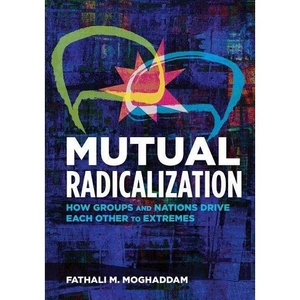Mutual Radicalization: How Groups and Nations Drive Each Other to Extremes

Speaker: Dr. Fathali Moghaddam (Georgetown University)
Date: 11 December 2019
Speaker Session Preview
SMA hosted a speaker session presented by Dr. Fathali Moghaddam (Georgetown University) as a part of its CENTCOM Population Dynamics Speaker Series.
Dr. Moghaddam’s brief focused on the topics discussed in his book, entitled Mutual Radicalization: How Groups and Nations Drive Each Other to Extremes. He first explained that there is a collective aspect of radicalization. The process of radicalization involves collective movements wherein an individual is pushed in particular directions irrespective of their individual cognitive processes and judgment. In other words, the group takes over, and individuals can no longer fully think for themselves. He further explained that mutual radicalization can be symmetrical, particularly when it comes to nations that are convinced that destructive conflict is the only way in which they can resolve their issues. Dr. Moghaddam then discussed the three stages within his model of mutual radicalization: 1) group mobilization, 2) extreme in-group cohesion, and 3) agnostic identity transformation. Group mobilization occurs when two groups become increasingly aware of their differences, categorize in- and out-group members in a harsher way, feel injustice and unfairness, and begin to perceive the other group as being not just unfair but evil. Extreme in-group cohesion occurs when there is more aggressive leadership on both sides, greater conformity and obedience, and additional cognitive convergence. Finally, antagonistic identity transformation occurs when each group becomes simply “the group that hates the other group” and takes more extreme actions against the other. Next, Dr. Moghaddam applied his model of mutual radicalization to the situation in Syria. He stated that there are three levels of relationships within Syria: 1) national relationships among Alawite Shiites (the very small minority; includes Bashar al-Assad and his supporters) and among Sunni Arabs (the large majority, ruled by the Shiite minority); 2) local relationships with Syria’s neighbors, such as Iran, Saudi Arabia, and the Kurds; and 3) international relationships with the US, Russia, and China. For the remainder of his brief, Dr. Moghaddam explained how the three stages of mutual radicalization have been reflected during the Syrian civil war.
Speaker Session Audio Recording
Briefing Materials
Biography:
Fathali M. Moghaddam is Professor of Psychology and Director of the Interdisciplinary Program in Cognitive Science at Georgetown University, Washington D.C., U.S.A. Since 2014 he has served as Editor-in-Chief, Peace and Conflict: Journal of Peace Psychology (published by the American Psychological Association). Dr. Moghaddam was born in Iran, educated from an early age in England, and returned to Iran with the revolution in 1979. He was researching and teaching in Iran during the hostage taking crisis and the first three years of the Iran-Iraq War. After work for the United Nations, he researched and taught at McGill University, Canada, from 1984, before moving to Georgetown in 1990. He has conducted experimental and field research, as well as been involved in applied projects, in numerous cultural contexts and published extensively on the psychology of conflict, terrorism, democracy, and dictatorship. His most recent books are ‘The Psychology of Dictatorship’ (2013), ‘The Psychology of Democracy’ (2016), ‘Questioning Causality: Scientific Explorations of cause and Consequence Across Social Contexts’ (2016, with Rom Harre), ‘The Encyclopedia of Political Behavior’ (2 vols. 2017); ‘Mutual Radicalization: The Psychology of How Groups and Nations Drive Each Other to Extremes’ (2018), ‘The Psychology of Radical Social Change’ (with B. Wagoner and J. Valsiner, 2018). His most recent book is ‘Threat to Democracy: The Appeal of Authoritarianism in an Age of Uncertainty’ (2019). More about his research and publications can be found on his website: fathalimoghaddam.com
This speaker session supported SMA’s CENTCOM Population Dynamics project. For additional speaker sessions and project publications, please visit the CENTCOM Population Dynamics project page.
Comments